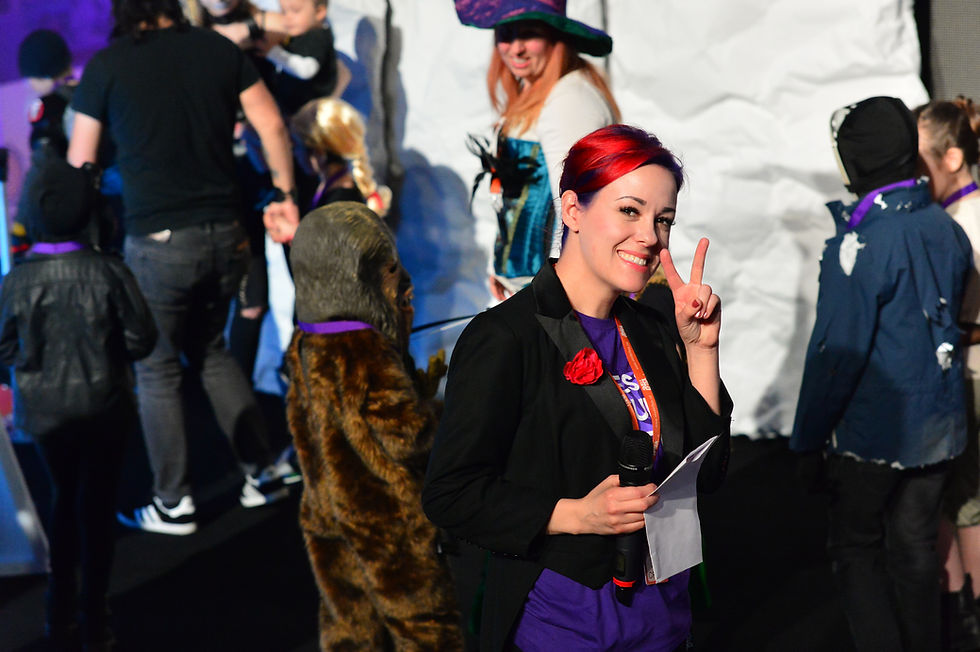Personal experience drives inclusive design at Mojang Studios
- The Goose

- Feb 19, 2021
- 3 min read
Updated: Aug 24, 2022
Inclusive game design has shaped the development of Mojang Studio’s biggest title and one of the world’s most popular games: Minecraft. With more than 126 million players worldwide, it’s clear that inclusivity isn't just a buzzword. This approach can produce commercially successful games that engage players of all kinds.
Agnes Larsson and Patrick Liu are two of the driving forces behind Minecraft’s continued success. They are also leading voices in the Studio’s effort to make games a safe and welcoming space for all.
Ahead of their appearance at Friday Stories on February 26th, we spoke to Agnes and Patrick about what motivates their commitment to making room for everyone in games.
Minecraft as a tool for change
Mojang Studios is on a mission to build a better world through the power of play. According to Head of Games, Patrick Liu, that means making more games accessible to more people. While this reflects an emerging trend in the games industry, Mojang Studio has paved the way with the Minecraft franchise.
“We’re interested in finding ways to enable everyone to play Minecraft. Of course, we’re uniquely positioned with the game that we have,” Patrick explains. “It’s easier for Minecraft to do this work than, say, games about shooting people. The game’s creativity helps us drive these questions.”
Minecraft’s global success is another factor in why they tirelessly push the game’s potential to engage different people. Vanilla Minecraft Game Director Agnes Larsson explains that “since we’re reaching so many players, we have to be responsible and do what we can”.

Professional and personal motivations
While Mojang Studios has a clear agenda, this work is more than a professional obligation. “If it weren’t already a trend, we’d force it to happen,” Agnes explains. “We’re very passionate about making games and the games industry truly for everyone. It’s our job, yes, but it’s also one of our biggest personal interests.”
Patrick notes that many of his colleagues join the Studio “with these beliefs already for various reasons drawn from personal experience and the backgrounds we have as a diverse team”.
This reflects Patrick’s experience as a person of color growing up in Sweden. “This set its mark on me,” he explains. “Not being included because I was seen as different is one of the driving forces in my work for inclusion.”
Agnes had a different experience but it impacted her in the same way. As a child, she was shy and felt quite different - and often very clumsy - when it came to socializing. That made her an easy target for bullying. As a result, Agnes was often too fearful and anxious to express herself the ways she wanted to. Now, Agnes is dedicated to making games where players can be themselves:
“That’s the beautiful thing about Minecraft, you really make it into your own game. So we are always asking how we can make sure we add something for everyone in bigger updates. And do that without accidentally breaking the game for anyone.”
Of course, there are commercial benefits to inclusivity. Patrick puts it simply: “If more people can play your game, you’ll sell more copies. That’s important from the perspective of a budding game maker.”
Diversifying players will also be achieved by diversifying the types of games on the market. Here, Patrick is avid that the industry must change:
“Having made many different types of games, from shooters to casual mobile games, I think that developers can be quite conservative and disregard what's outside this bubble called core gaming. I have a personal interest in changing that perception.”
A new conversation every day
For design students and early-career professionals, actively engaging the issue of inclusivity is particularly important, as it will always be topical in the games industry. As Patrick cautions to anyone thinking this issue is an issue that can be solved:
“The topic is always evolving. The conversations we’re having today are not the conversations we were having five years ago. We’re always educating ourselves and training our staff in the latest thinking. It’s an ongoing thing - always.”
Sign up for the first Friday Stories of 2021 and join the conversation. In addition to sharing their insights, Patrick and Agnes will be answering your questions about inclusive design and its role in game development. Register for the follow-on workshop, too. They look forward to seeing your work and learning from your ideas.

Source for picture: IGDB




Comments